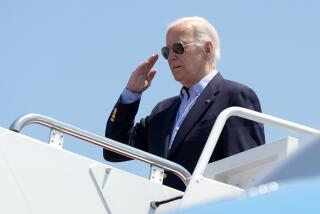Poland’s New President Quits His Party : Politics: Founder of group for ex-Communists drops his membership in bid to unify nation.
Aleksander Kwasniewski, the former Communist who was elected last week as president of Poland, resigned Saturday from the party of ex-Communists he founded nearly six years ago.
Kwasniewski said his resignation from the Social Democracy of the Republic of Poland was intended to send a signal to a nation severely divided by his victory over incumbent President Lech Walesa, though critics doubted that it will have any significant healing effect.
The party of reform-minded ex-Communists has been the main force in a coalition of left-wing parties, known as the Democratic Left Alliance, which won parliamentary elections two years ago and provided the core of Kwasniewski’s constituency in the presidential contest.
“My heart most certainly has been, is and will remain on the left side,” he told a party meeting in Warsaw. “But because of the feeling of responsibility I have today, I would like to resign from all my functions in the party and my membership.”
Kwasniewski turned in his party identification tag, No. 13, to Prime Minister Jozef Oleksy, another ex-Communist. Kwasniewski warned party leaders that governing could become difficult, because critics will be searching for signs of slippage toward the Communist past.
“We will be watched,” he said.
Jerzy Wiatr, a member of the party’s national presidium, said Kwasniewski was following a longstanding tradition, now mandated in the country’s temporary constitution, that the president be above partisan politics. He said the resignation had been expected by party leaders.
“The idea is the president should represent the whole nation and therefore should not be the member of any political party,” Wiatr said. “That is it, simply, nothing more.”
But political analyst Edmund Wnuk-Lapinski, who supported Walesa in last week’s vote, said it was a hollow gesture that has had little meaning in the past and would do little to sway voters.
“I doubt people will be convinced that the relationship between Mr. Kwasniewski and the party from which he just resigned will be changed,” said Wnuk-Lapinski, director of the Institute of Public Affairs in Warsaw. “He will be in charge anyway.”
In an interview with The Times, Kwasniewski said last week that he wanted to broaden public confidence in his presidency by also offering high-profile government posts to members of the opposition, a move that reportedly has been resisted by some leaders in his party. It is uncertain, however, whether any prominent opposition figures would accept such an appointment because of his Communist past.
“Politically speaking, it is a very smart move because he will probably make the offers public and the eventual rejection will also be publicly made,” Wnuk-Lapinski said. “Then there will be no other solution than for him to appoint his own people.”
More to Read
Sign up for Essential California
The most important California stories and recommendations in your inbox every morning.
You may occasionally receive promotional content from the Los Angeles Times.






